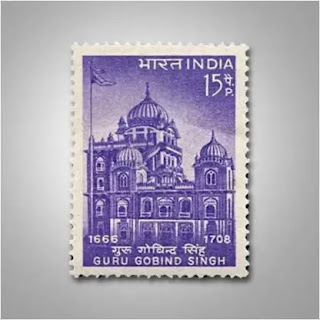Guru Gobind Singh born Gobind Das or Gobind Rai (22 December 1666 – 7 October 1708) was the tenth and last human Sikh Guru.He was also a warrior, poet, and philosopher. At the age of nine—after his father (Guru Tegh Bahadur) was executed by Emperor Aurangzeb—he was formally installed as the leader of the Sikhs.His four biological sons died during his lifetime – two in battle and two executed by the Mughal governor Wazir Khan.
Among his notable contributions to Sikhism are founding the Sikh warrior community called Khalsa in 1699 and introducing the Five Ks, the five articles of faith that Khalsa Sikhs wear at all times. Guru Gobind Singh is credited with the Dasam Granth whose hymns are a sacred part of Sikh prayers and Khalsa rituals.He is also credited as the one who finalized and enshrined the Guru Granth Sahib as Sikhism's primary scripture and eternal Guru









